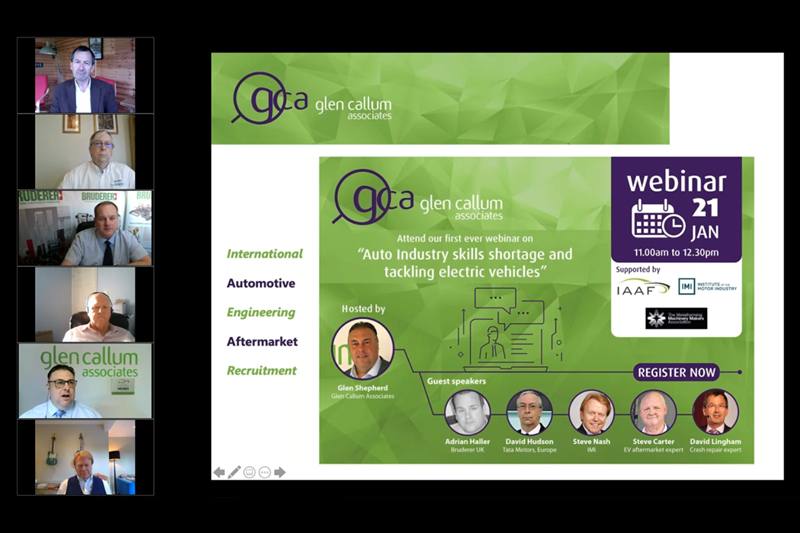
Glen Callum Associates has urged the automotive aftermarket to embrace electric vehicles or risk getting left behind in an exclusive webinar.
Supported by trade associations IAAF, IMI and MMMA, the webinar, titled ‘Auto industry skills shortage & tackling electric vehicles (EV)’, challenged perceptions about how the trade could embrace an alternative fuel future.
An expert panel comprising businesses and associations from engineering, crash repair, electromechanical and automotive sectors, explored whether the aftermarket is prepared for an EV future, with the experts unanimously urging businesses to invest in technology and training sooner rather than later.
First up, Adrian Haller, Managing Director of Bruderer UK, discussed working with high voltage/high amperage machines and the engineers of the future.
He commented: “We need to uplift the perception of engineering, as people automatically think of dirty, dark environments but it’s not at all like that. New technology means the environment is clean, warm and bright, similar to a lab or a clean-room environment. Manufacturing engineering is the place to be and is there for the future.”
A poll, taken at the start of the webinar also found that 71% of ‘attendees’ believed that engineering suffers from a poor image perception, highlighting the importance to raise the image of automotive and engineering career opportunities, and the need to grade the proficiency of engineers.
Up next was Steve Carter, automotive aftermarket EV Specialist, talking about the current challenges in handling EVs in the workshop.
He said: “In 2010 there were only six electric vehicles available, but last year there was a choice of 110, and this is predicted to rise to over 300 by 2025. These will naturally filter down into the aftermarket, so it’s essential staff are fully trained and qualified to reduce risks from the get-go.”
A second poll asking: ‘Is the UK aftermarket underestimating the impact of the EV revolution?’ found that an overwhelming majority of participants (92%) answered ‘yes’, showing that the UK aftermarket is underestimating the resource and skills needed for EV.
David Hudson from Tata Motors in Europe, also urged the automotive aftermarket to act sooner rather than later when it comes to EV training. He commented: “Engineering graduates are already gaining skills to work with OEMs, but the service technician training route also needs to be similarly adapted.
“Those entering trade training are already a lot more prepared than previous generations, thanks to structured training regimes at academies offering mechanical and electrical possibilities.”
A poll taken during David’s talk found that there was hesitancy towards the longevity of EV, though 53% said there would be long-term careers from this revolution.
Next up was David Lingham, crash repair and business specialist, who believes the collision market needs to reposition itself in order to thrive.
David said: “We need to start the change now, and not wait for others to catch up. Recruitment should be seen as an integral part of a company’s marketing strategy and we should be creating the perception that we’re the industry of the future, and EVs are a platform for us to achieve that.”
In another poll, 95% of respondents said the industry needed to re-badge job titles to modernise them and think about future career titles if it is to attract future talent.
Finally, attendees heard from Steve Nash from the IMI, who again reiterated the need for preparation. He concluded: “Although the internal combustion engine won’t completely disappear anytime soon, there is a fast development cycle and the advent of electrified vehicles and the proportion of vehicle parc they represent will grow rapidly.
“This is happening sooner than many believe and it’s important that technicians do not put off training.”
In the fifth and final poll of the webinar, participants were asked: ‘How prepared are you for handling the sale, service and repair of EVs?’ with 45% saying partially and 13% saying well prepared.
Glen Shepherd, GCA Managing Director, concluded: “As we work very closely with forward-thinking aftermarket professionals, we’re able to share our expertise on current trends to help put in place recruitment strategies that can help them future-proof their businesses.
“After hearing from our panel of specialists, it’s clear that electric vehicles are not only the future of the aftermarket, they are also the present, and it’s crucial that we start to adjust accordingly to ensure we, as an industry, are fully prepared and ready to service and repair this type of vehicle in the not-so-distant future. There is, however, light on the horizon, as the polls prove that there are tentative signs that the industry is starting to prepare for EVs and other fuel types and we’re excited for what’s ahead.”







